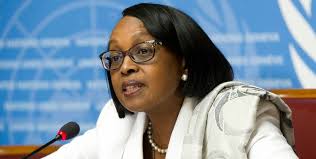By Asma’u Ahmad
The World Health Organisation (WHO) has urged African leaders not to relent in the training of Primary Health Care workers on how to detect and manage common mental health problems.
WHO Regional Director for Africa, Dr Matshidiso, made the call in her message to mark the 2018 “World Mental Health Day” celebrated yearly on October 10.
She also called on parents, caregivers and teachers to build life skills of children and adolescents to help them in coping with everyday challenges as those early years was a time of change for most young people.
She said that this period could come with stress and anxiety which often led to serious mental illness if not recognised and managed on time.
According to the regional director, worldwide, 10 to 20 per cent of children and adolescents suffer from mental disorders.
She said that depression was the third leading cause of mental illness and disability among adolescents globally while suicide was the second leading cause of death among 15 to 29 year olds.
“Adolescence and the early years of adulthood are a time of change; moving, schools, leaving home and starting work.
For many, these can be times of stress and anxiety and these feelings can lead to serious mental health if they are not recognized and managed well.
“In the African region, it is estimated that five per cent of the population aged below 15 years suffer from a mental disorder.
“Half of all mental illness begins by the age of 14 years but most cases go undetected and untreated with serious long term consequences for mental health.
“Children and adolescents in humanitarian settings are particularly vulnerable to mental distress and illness.
“The harmful use of alcohol and illicit drugs among adolescents contributes to risky behaviors such as violence, unsafe sex, and dangerous driving.
“Children and adolescents with mental health disorders often face stigma and limited access to health care and education in violation of their human rights.
“I therefore, call on governments in the region to develop and strengthen evidence-based programmes for young people with the support of national policy makers and programme managers.
Moeti said that although countries in the region were making progress in addressing the problems of mental health, much more could be done to build mental resilience from an early age.
She said this would help prevent mental distress and illness among adolescents and young adults and manage recovery.
The regional director maintained that mental health remained fundamental to overall health and for achieving the Sustainable Development Goals (SDGs).
Moeti also called on governments, interested partners and civil society to continue collaborating with WHO to improve response to adolescents’ health needs.
Every year the world observes World Mental Health Day to draw attention to the importance of mental health. The theme for this year is “Young People and Mental Health in a Changing World”.



